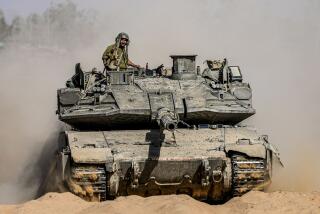Iran’s other youth movement
On the fashionable streets of the city’s north, young men and women in bluejeans and designer clothes sometimes smirk at Morteza Amiri, with his thick black beard and black shirt. They stare, sometimes mocking him with religious chants.
But Amiri, a pious 22-year-old from the south of Tehran, just smiles. He knows who he is and where he comes from. He rests easy in the comfort that he is not alone. Unlike those of his generation who clamor for social and political change, Amiri is a stalwart supporter of President Mahmoud Ahmadinejad and supreme leader Ayatollah Ali Khamenei. He is a proud member of the Basiji militia, which many say took part unofficially in a recent crackdown throughout the streets of the capital.
And he believes his side is growing.
“It’s not only the bearded people who are true believers,” said Amiri, who operates a small shop selling Islamic books and CDs in downtown Tehran. “Look at my customers. Many of them are cleanshaven and wear jeans.”
Although Western analysts believe Iran’s youthful population strives for change and can be coaxed to revolt, the country’s conservative leaders have also been wooing their young.
They allow pop musicians who sing songs that sound like those of Persian counterparts in Los Angeles, except for the lyrics praising Shiite saints. They’ve placed techno rhythms beneath the speeches of the late Ayatollah Ruhollah Khomeini, launched television and radio programs geared for the young, and produced pop versions of old revolutionary chants. They mass-produce religiously inspired CDs, DVDs and MP3s.
Amiri’s shop, on the second floor of a shopping arcade, is called the Voice of the Martyrs. It fills up with students from the nearby university. A CD of Shiite lamentations, set to techno music and a two-beat tempo, plays in the background. A young man walks into the shop asking for a copy of the lamentation ceremony marking Imam Hussein’s martyrdom in which Ahmadinejad and some of his Cabinet and vice presidents took part.
“It is sold out,” Amiri tells him. “We will make copies in the coming days, God willing.”
Posters of Khomeini and Khamenei share the walls with perfumes and colognes, re-branded as “Scent of Imam Hussein’s Holy Shrine in Karbala.” They sell briskly.
“We sell only scents that pilgrims smell in Imam Hussein’s holy shrine,” Amiri says. “So we help people to make an imaginary pilgrimage by perfume.”
Amiri hails from a family of modest means. He lives at home with his mother and father, who retired from a state-owned pharmaceutical company and collects a $400-a-month pension. Amiri earns about $110 a month. “My parents with their three children can live up to their simple Islamic standard,” he says.
His free time revolves around family, prayer and pilgrimage. Every Thursday night he visits Khomeini’s shrine south of the capital to mourn his death.
“Why did I vote for Ahmadinejad?” he says. “He is one of us. He is not a corrupt politician. He is representing the grass-roots, the backbone of the revolution. He is not a crook.”
Iman Ali-Agha, a 24-year-old seminary student, arrives at the shop. He and Amiri exchange pleasantries. He visits regularly to buy CDs for himself and his classmates. He says he’s a true believer in Islam and hopes one day to wear the black turban of a cleric descended from the prophet Muhammad.
“Iranians at the bottom of their hearts, no matter how they look, are religious,” he said. “Of course for a tiny minority, the Islamic lifestyle is intolerable. They might be not happy.”
But though he voted for Ahmadinejad in the last election and will probably vote for him again, Ali-Agha is no longer loyal to the politically motivated Basiji militia, which numbers more than 10 million followers officially. He’s disillusioned with politics.
“I think their sincerity has diminished, and nowadays their hypocrisy is prevailing,” he said. “So, I have devoted myself to theology and purifying myself as a servant of God’s cause.”
Amiri doesn’t worry about his friend’s lapses. There will be other recruits.
“Don’t be confused by appearances,” he said. “Faith runs deep in the skin, and many who do not look like us are supporters of Ahmadinejad. Anyone who is in touch with the grass-roots is potentially a Basiji.”
*
Special correspondent Mostaghim reported from Tehran and Times staff writer Daragahi from Cairo.
More to Read
Start your day right
Sign up for Essential California for news, features and recommendations from the L.A. Times and beyond in your inbox six days a week.
You may occasionally receive promotional content from the Los Angeles Times.






